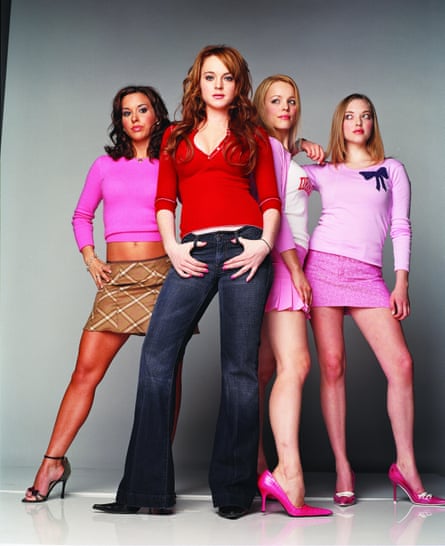B
Because time is a human concept, it is currently the year 2024 and the most successful movie at the box office is… Mean Girls. This is the latest adaptation of the popular Broadway musical based on the beloved 2004 film, which seems to be a prime example of modern IP ouroboros. (Similar to High School Musical: the Musical: the Series, but with even more profitability.) Despite receiving mixed reviews and multiple trailers that avoided showcasing any of the musical numbers, the new Mean Girls surpassed the original in terms of box office earnings during the MLK holiday weekend with $33 million. Adjusted for inflation, the first Mean Girls would have made around $40 million on its opening weekend. Staying true to the original’s essence, the Mean Girls musical movie has also sparked a wave of memes – such as not realizing it was a musical or Reneé Rapp (who plays Regina George) channeling her character during a press junket with a tour bus company owner.
For those who doubt, the interest in the new Mean Girls heavily relies on its ability to differentiate itself from the modern classic. “It’s not simply a replication of the original,” I overheard one woman recommend after a pilates class. “There are fresh songs and jokes.” This statement holds some truth – Tina Fey, the original writer (and Ms Norbury), has updated the script to reflect current times, incorporating humor about slut-shaming and TikTok. Costume designer Tom Broecker received some controversy for drawing inspiration from both “on Wednesdays, we wear pink” and the vividly colored teens from Euphoria. The musical numbers are composed by Fey’s husband Jeff Richmond (music) and Nell Benjamin (lyrics). However, the new adaptation struggles to prove its worth, often feeling like a more polished but excessively rehearsed karaoke rendition of an incomparable original.
The success and existence of the new Mean Girls shows that the original film continues to be deeply loved, making any variation of the concept enjoyable. Despite being released two decades ago and containing dated references, Mean Girls remains highly relevant in popular culture. The interest in the new film reinforces a point made in Jennifer Keishin Armstrong’s book, So Fetch: The Making of Mean Girls (And Why We’re Still So Obsessed With It), that no other movie from the 2000s has had as much impact on pop culture. Even after 20 years and numerous references to iconic lines like “you can’t sit with us,” we still can’t seem to get enough of Mean Girls.

The movie has maintained its relevance in part due to its relatability. The complex rules and codes of the Plastics – the group led by Regina George (played by Rachel McAdams/Reneé Rapp), Gretchen Wieners (played by Lacey Chabert/Bebe Wood) and Karen Shetty (played by Amanda Seyfried/Avantika Vandanapu) – have always been exaggerated, and the ways in which cliques operate have drastically changed. However, the idea of a perplexing maze of highly specific social norms – one that would confuse even someone like Cady Heron (played by Lindsay Lohan/Angourie Rice) who is new to the teenage girl world – remains. Armstrong commented via email, “Bullying and power dynamics within social groups have not decreased, and may have even become more prominent due to factors such as social media and polarization in America. We can all relate to this on some level, regardless of our age or gender.”
The film’s quotability has greatly contributed to its success. Many lines from Mean Girls have become ingrained in popular culture, appearing in memes, gifs, and TikToks. These include phrases like “it’s October 3rd,” “there’s a 30% chance that it’s already raining,” and “get in loser, we’re going shopping.” If you were in a school setting, a girls’ locker room, or a mall between 2004 and 2014, you likely heard these lines. The film’s title has also become synonymous with a certain type of behavior that remains relevant in today’s obsession with girlhood. According to Armstrong, people understand the term “Mean Girls” and its connotations in various contexts, such as referring to teenage girls, a boardroom, reality TV, or politics.
The success of Mean Girls can be attributed to its timing. It was released during the rise of social media platforms like MySpace and Facebook, making a lasting impression on the minds of millennials who would go on to become creators and influencers on sites like BuzzFeed. According to Armstrong, the film was a key influence on the development of Web 2.0 and was easily relatable to the emerging genre of memes. It also tapped into the tabloid culture of the early 2000s through the star power of Lindsay Lohan, who gained widespread fame through her role in Mean Girls and later became a target of paparazzi and a cautionary tale in the era’s unforgiving blogosphere – essentially, the mean girls of the internet at the time.

Not all of this necessarily applies to the current digital and video-focused world or appeals to the younger generations, known as gen Z or gen Alpha, with the oldest currently in their first year of high school. The new movie attempts to appeal to this tech-savvy audience through the use of front-facing cameras and references to TikTok, as well as a plot point that briefly becomes viral Instagram content ridiculed by a group of students from a high school on the North Shore. However, research for her book showed that younger audiences – those currently in middle and high school, the same age group that Mean Girls was originally aimed at – still relate to the original film. Even if they haven’t seen it, the iconic quotes live on through memes and TikTok. The Y2K fashion is now considered trendy, and the pre-cellphone school experience is seen as nostalgic and stylish.
According to Armstrong, it is difficult to predict the lasting impact of pop culture items, but Mean Girls has remained relevant for 20 years and its central ideas appear to be timeless and relatable. It is likely that Mean Girls will continue to be a beloved coming-of-age classic, similar to other iconic films such as those by John Hughes, Clueless, and Rebel Without a Cause. However, it is uncertain if the new movie musical will have the same lasting appeal. Armstrong acknowledges the existence of a new version, but believes that people will always gravitate towards the original.
Source: theguardian.com


